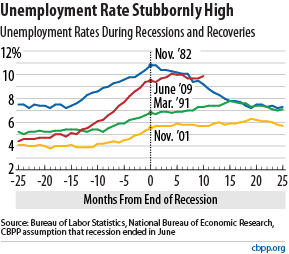In another sign of growing confidence in the economy, employers hired an additional 290,000 workers in April, the highest monthly job increase since 2006, according to a Bureau of Labor Statistics report released on Friday.
There were two reasons to celebrate the new jobs report: First, the employment numbers exceeded economists’ April predictions of 200,000; and second, most gains were in the private sector, which saw an increase of 231,000—the fourth straight month of private sector job. Government hiring was also up, to the tune of 66,000, primarily due to the continued hiring of temporary workers for the 2010 Census.
But the good news was tempered by a rise in the unemployment rate, from 9.7 to 9.9 percent in April. “There is still an enormous shortage of jobs,” said Heidi Shierholz, an economist at the Economic Policy Institute in Washington, D.C. “To end this, we will need job growth at least as fast as this month’s to persist for the next four or five years.” Dean Baker, co-director of the Center for Economic and Policy Research, a liberal think tank, said at this rate it would take 80 months to recover the eight million jobs lost from the recession since December 2007. Others echo that, but add that the U.S. economy must grow faster than the current 3.2 percent annual pace, which was reported in the first quarter of 2010.
At the White House on Friday, President Obama said the jobs report was encouraging but that more needs to be done; he pledged to create more jobs. “We’re not going to rest until we put this difficult chapter behind us,” he said. “But we’ve also come a very long way. And we can see that the difficult and at times unpopular steps that we’ve taken over the past year are making a difference.”
Obama emphasized the hiring incentives that were put in place for manufacturers and small businesses, including a $5,000 tax credit for every net new employee hired in 2010. Small businesses arealso exempt from paying Social Security payroll taxes on newly employed workers. Companies would net $1,000 on their 2011 tax returns, or 6.2 percent of wages paid for any new employees retained for one year.

Long-term unemployment is still a real concern. April’s report shows that the number of individuals who have been on unemployment for six months or longer rose to 6.7 million—a record 45.9 percent of total unemployment.
Congress has extended unemployment benefits three times since the start of the recession in December of 2007. In most states, regular unemployment benefits last for 26 weeks. But individuals in some states can claim unemployment benefits for up to 99 weeks as a result of the Emergency Unemployment Compensation (EUC) and extended benefit programs, which extend through June 2.
Chad Stone, economist at the Center on Budget and Policy Priorities, in Washington, D.C., echoed others who called the jobs report good news , but added that the “economic recovery will have to gather more strength to bring down the unemployment rate.” Stone suggested Congress should extend the Recovery Act to provide extra weeks of unemployment insurance and subsidize COBRA health insurance coverage through the end of the year. Added government spending to boost the economy would be helpful for all unemployed workers, he said. He also said additional financial assistance should be given to cash-strapped states to help create jobs and boost economic activity.





